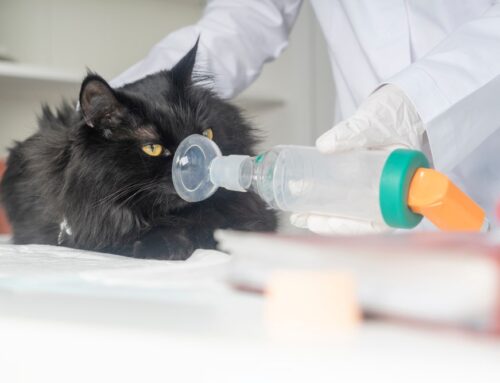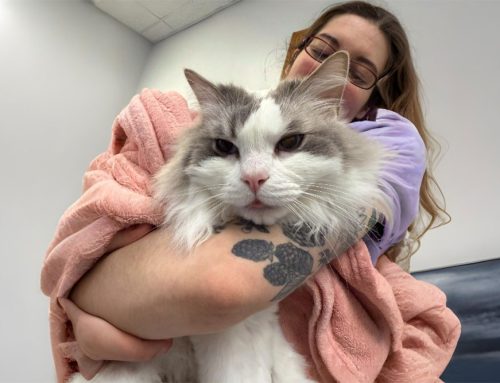Wellness care helps maintain your furry friend’s health and is important for disease prevention. Veterinary exams, proper nutrition, exercise, vaccinations, and preventive measures can significantly reduce your pet’s health issue risk. Our Animal Urgent Care of Oconomowoc team explores some common diseases in pets that can be prevented through diligent wellness care.
1. Parvovirus in dogs
Parvovirus—parvo—is a highly contagious and potentially fatal viral disease that affects puppies and unvaccinated dogs. This virus primarily attacks the gastrointestinal (GI) tract, leading to severe vomiting, diarrhea, dehydration, and sometimes death. Parvo is often a veterinary emergency, and affected dogs must be hospitalized and treated with medications and supportive care. The best prevention is regular vaccinations, starting from a young age and continuing with booster shots as recommended by our veterinarian.
2. Feline leukemia virus
Feline leukemia virus (FeLV) often causes cancer in cats and can also lead to anemia and immune deficiency. Cats can contract the virus through close contact with infected cats, often in places where felines are in close quarters such as shelters. Having your cat vaccinated and keeping them indoors can significantly reduce their infection risk. If you already have a household cat, have a new cat tested before bringing them home to help prevent FeLV’s spread.
3. Heartworm disease in pets
Heartworm disease, caused by a parasitic worm transmitted through a mosquito bite, affects dogs and cats. This disease can lead to severe heart, blood vessel, and lung damage. Preventive medications, given to your pet monthly, can protect your furry friend from this potentially deadly disease. Annual testing for dogs is also crucial, as early detection can improve the chances of successful treatment.
4. Rabies in cats and dogs
Rabies is a viral disease that affects the central nervous system of mammals, including pets and people. Once physical effects appear, this virulent disease is almost always fatal. Rabies vaccination is crucial for your pet’s health and is often required by law. Keeping your pet’s rabies vaccination up-to-date can protect them from this deadly virus.
5. Lyme disease in pets
Lyme disease is transmitted through an infected tick’s bite, resulting in fever, joint pain, and other serious medical signs. Preventive measures include administering monthly tick preventives, checking your pet for ticks after outdoor activities, and maintaining a tick-free environment in your yard. Vaccination is also available for dogs who have a high exposure risk.
6. Feline upper respiratory infections
Feline upper respiratory infections (URIs) are commonly caused by viruses such as herpesvirus and calicivirus. These infections can lead to sneezing, nasal discharge, lethargy, weakness, and eye problems. Vaccination, good hygiene, and reducing your feline friend’s stress can help prevent these infections, along with annual wellness exams to help catch any early illness signs.
7. Canine distemper
Canine distemper is a highly contagious viral disease that affects a dog’s respiratory, GI, and nervous systems. Vaccination is the most effective way to prevent distemper. Puppies should receive the vaccination series starting at 6 to 8 weeks old, with boosters given throughout their lives.
8. Dental disease in pets
Dental disease is one of pets’ most common health issues, affecting two-thirds of all pets older than 3 years of age. Dental—periodontal—disease can lead to pain, tooth loss, and infections that can spread to the kidneys, liver, and heart. Regular dental checkups, professional cleanings, and at-home dental care, such as brushing your pet’s teeth, can help prevent dental disease.
9. Obesity-related conditions in pets
Obesity can lead to various health problems in pets, including diabetes, arthritis, and heart disease. Provide your pet with daily exercise, a balanced diet, and portion control to maintain their healthy weight. Our Animal Urgent Care of Oconomowoc veterinarian can help you create a customized diet and exercise plan for your pet if they suffer from obesity-related conditions.
10. Flea and tick diseases in pets

Fleas and ticks can cause various issues, from skin irritations to serious diseases, including Lyme disease, Rocky Mountain spotted fever, and tapeworms. Preventive treatments, such as topical and oral medications, can help protect your pet from these parasites. By regularly grooming and checking your pet’s coat, you can help find fleas and ticks and eradicate them as soon as possible to prevent them from causing your pet severe health issues.
Preventive wellness care is a must to help keep your pet in excellent health. Regular veterinary visits, vaccinations, proper nutrition, and preventive measures can significantly reduce your pet’s disease risk. By proactively approaching your four-legged friend’s health, you help them live a long, healthy, and happy life. If your pet shows illness signs, contact our Animal Urgent Care of Oconomowoc team for diagnosis and treatment.







Leave A Comment